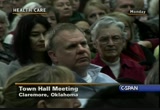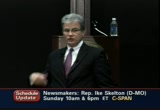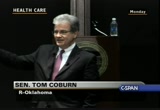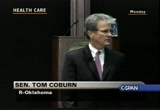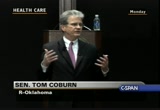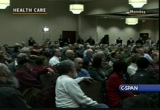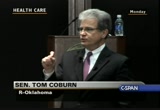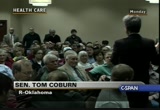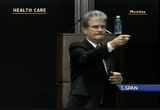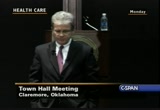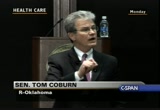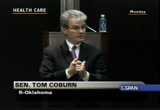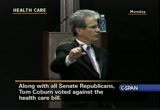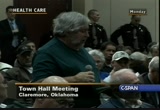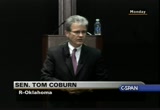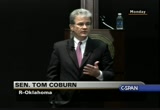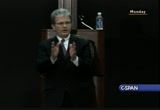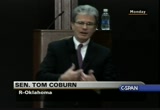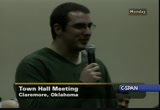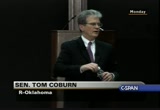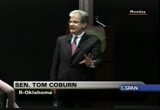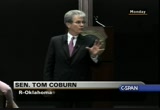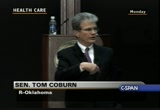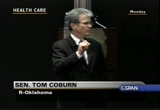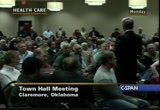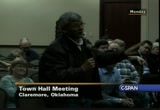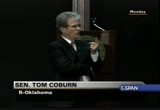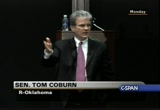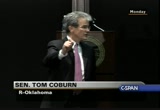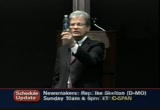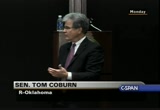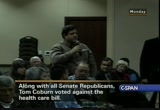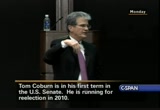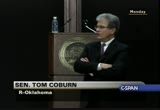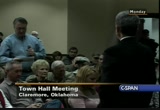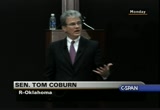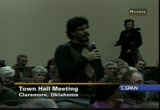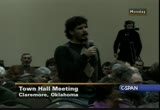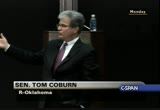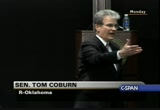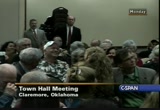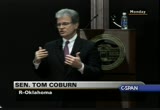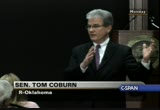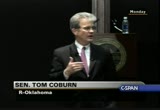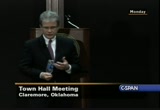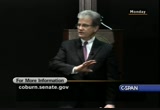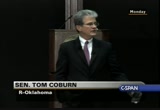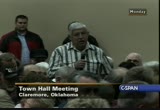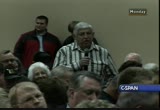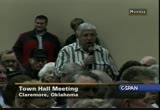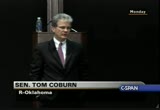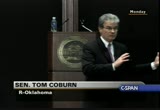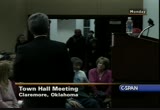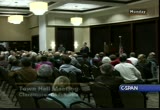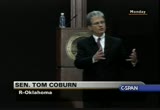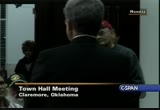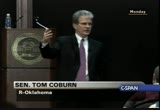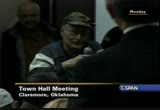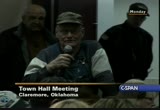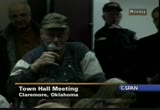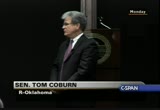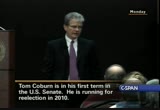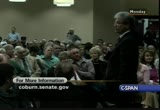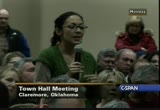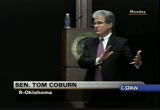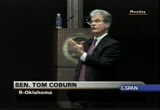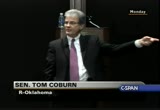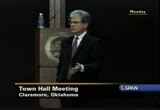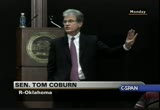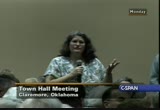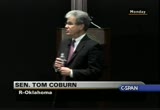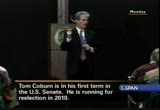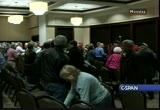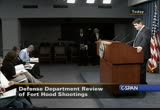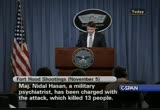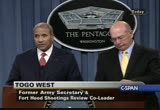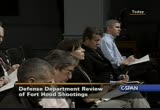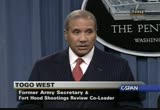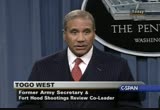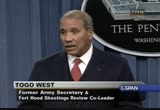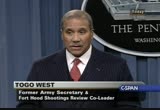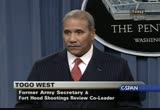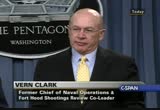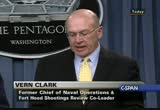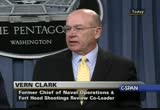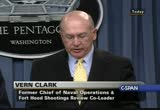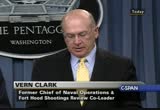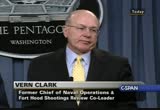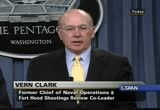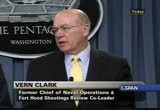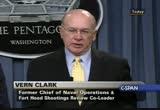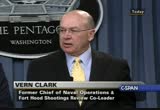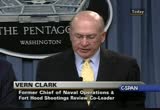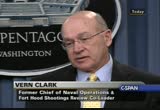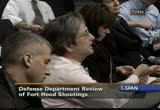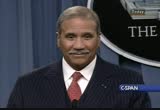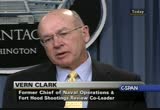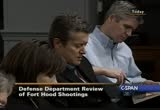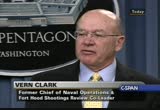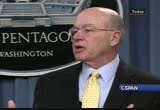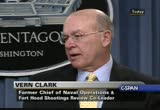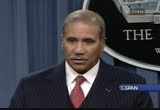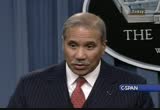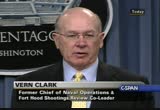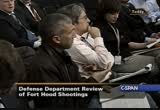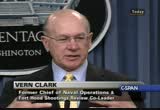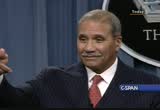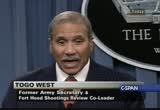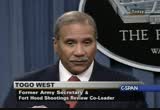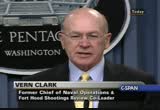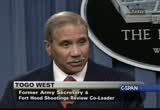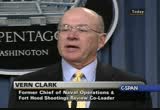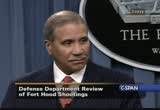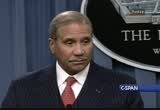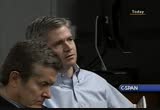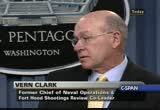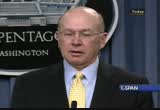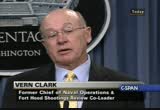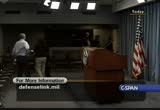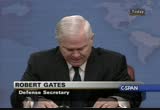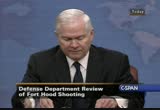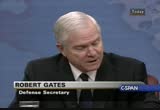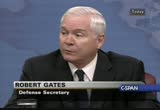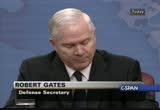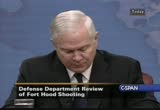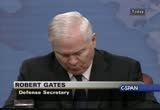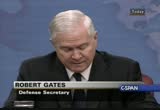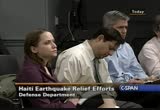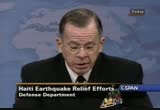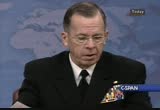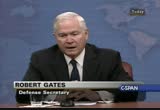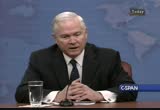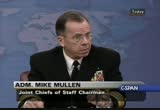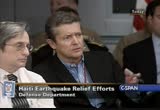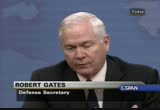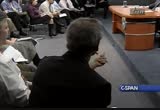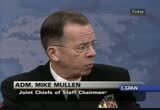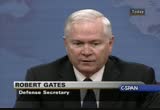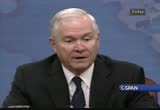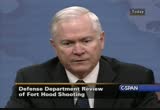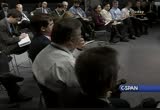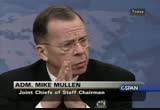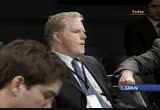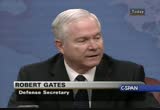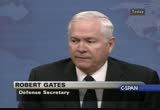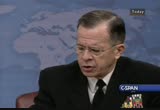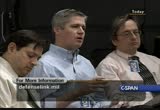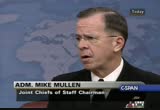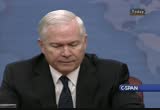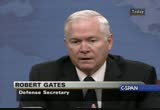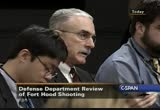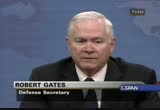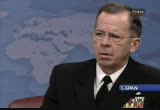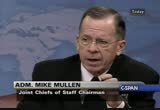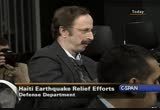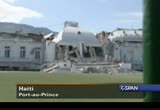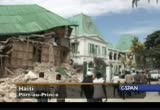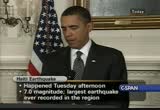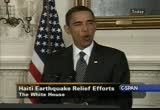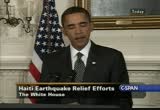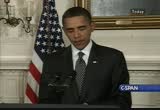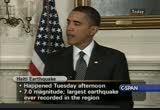tv Capital News Today CSPAN January 15, 2010 11:00pm-2:00am EST
11:00 pm
a year in health care, and we know somewhere between 500 and $700 billion of that doesn't help anybody get well and doesn't prevent anybody from getting sick. and our answer to that is more government. 60% of all health care is run by the government today. medicare, medicaid, indian health service, military, and v.a., tricare. 60% of it is run by the government. one of the reasons you have an absolute shortage of primary care doctors in this country is because we have set the price for what they're going to pay for primary care and the doctors won't go into it anymore, because there's a 350% payment differential. so we can either embrace our heritage, which says we've relied on markets to allocate scarce resources, or we can deny it and allow the government to run it. i think the health care bill ultimately will pass. i think they're going to buy
11:01 pm
the votes. you saw what happened in the senate. they're going to dot exact same thing in -- do the exact same thing in the house to get the votes they need and we will have a health care bill that the president will sign. don't think it's the best answer for us as a nation. i can tell you what's in that bill. it puts the government in charge of what you'll get, when you'll get it and where you'll get it, and that's even if you have private insurance. . . .
11:02 pm
provided you have to have some skin in the game, that is what is going to happen to you. if you do not think that is happening, go talk to oncologist today and cardiologists and ob/gyn costs and see how medicare is already rationing health care for women in this country. it is against the law. and they're doing it. markets work and we can either embrace them and say they're not going to be perfect -- no market is perfect -- which means that some people will lose. but look at medicaid. we have 17 million people in this country who are eligible for medicaid and are not signed
11:03 pm
up. that is our answer. that is what will happen to have the people under this bill. who do we have next? back over here. let's go back there. >> keith jenkins. >> i know keith and jenkins. i grew up down the street from him. >> that is right. what is the status of the government employees? and if they kicked it out, what is the argument? >> i have the amendment added in the committee, barely, by one vote. they refused to allow that amendment on the senate floor. first of all, it is not a cute amendment. it is common sense.
11:04 pm
if the members of congress are in it, it will be ok for everybody else. ñrthere might to take care of themselves. they refused and that is the senate rules. we were operating in a unanimous consent, which means that you have to have consent of the majority party to be able to put an amendment up and there would not put up hours. i had several amendments that did not get put up. remember, we took 2500 pages of legislation with 18 new government programs, 20,000 new federal employees, 1690 times that the hhs will control your health care and we had five true republican amendments to that over five and a half weeks. that is a crime. it is criminal. it is not that they can pass the bill. the fact is that we ought to
11:05 pm
have the vote and know what we are voting on and make sure that you get to see what we are voting on rather than pass the çóbill without amendments. when you have five republican amendments voted on and there are five corresponding democrats to make them look good or give them political cover, that is not legislating. that isñiçó not fair to the amen public. whether you are for a government-run health care system or not, it is terrible government. who's next? back over here. this lady right here. hang on. he's going to bring you a mikc. >> is there a chance that this bill can be held unconstitutional? >> did everybody your question? first of all, from a constitutional point of view, of whether or not the government can force you to buy something, that has a very good chance of
11:06 pm
being ruled unconstitutional. that is number one. it is highly unlikely that a pro tem lawsuit will have standing under the commerce clause, in regards to whatever senator nelson it or senator lantern or anything else that is discriminatory. you raise a great point. when we started losing its most as a country was when the supreme court decided a very little and broad interpretation of the commerce clause. if you go back and read what our founders had to say in article 1 section 8, the enumerated powers, which spells out specifically what the role of the federal government does, it does not fit at all with what we have been doing in the last 30 years in this country. it does not fit. yet we have used court precedent to justify ignoring the wisdom of our founding fathers.
11:07 pm
consequently, we have this ever- expanded federal government that is fairly arrogant, poorly responsive, and very expensive. the way to change that is to reinforce the 10th amendment which says that, whenever is not spelled out in article 1 section 8, is explicitly reserved for the people in the state's and use that as a tool to give courts to go back and reinforce the enumerated powers. it is going to be interesting. our survival, what causes us to look at the waist and the federal government and the areas where the federal government touches us and is arrogant and not helpful, and many times harmful, and see if we cannot strengthen the size of government to more manageable.
11:08 pm
>> thank you. i would like to say thank you for coming out. i took off work tonight. i appreciate you being here to answer this question. i have been without health insurance for close to 10 years. i'm self-employed. i pay state and federal taxes which provides for other people's health-care. because of the hard economic times coupled with the passage of payment personal care, i cannot afford insurance for me and my son. i had hoped that would be allowed to buy into other programs that are federally funded, but that has been ne ixed. this is my question. why do not want me to have health care? if you do want me to have health care, water use specifically doing to get it for me? >> i want you to have health
11:09 pm
care available for you. i want a good portion of that responsibility to be yours, not everybody else's in this room. all right, all right. what i would tell you we should do is we should change the tax code so that everybody is treated exactly the same. if you work for a business that provides health insurance, you get $5,700 worth of benefits, tax-wise. but if you do not work for someone that does, you get $4,700 worth of benefits, tax- wise. how does that benefit you? i suggest a refundable type of tax in this country. it would automatically give you and your family $5,700 tax-free with which to purchase health care. i would also say that you can buy it anywhere you want to buy.
11:10 pm
and you can buy what you want, which is good for you and your children, not what some bureaucrat or a state legislator or federal legislator says you have to buy. i believe that we can achieve that kind of care where you have the opportunity to have health care, you have the funds with which to do it, and we do not raise taxes one penny on the rest of the american people. we can do that. we would save $1 trillion in the first 10 years under that plan. that takes all medicaid patients and puts them into private health interests at half the cost that the state is presently spending on medicaid. that saves oklahoma about two billion dollars a year. is there a way for you to get health insurance that does not grow the federal government, that does not increase the spending of $1 trillion, that does not raise taxes over the next 10 years, that does not
11:11 pm
cut medicare? yes. i just outlined it. the area -- there are a lot of ways to get health care for everybody. one involves a helluva lot more government and the other one involves not more government so that you are treated the same as someone who works. the senate -- the self-employed person should get the same rate as somebody who works for a company that is provided health insurance. and you do not. >> [unintelligible] >> what you're saying is that you want government to manage the cost of health insurance. you ought to be able to go to market -- u.s. bows earlier that you believe in a market-oriented -- you espoused earlier that you believe in a market-oriented
11:12 pm
government. if you want to buy it in kentucky because it is cheaper for you and you get the same coverage, you ought to be able to do it. the same thing is true for providers. the should be able to provide insurance to anyone they want, as long as they have quality and transparency in their outcome and their profit. >> yes, sir. you have añi microphone coming o you. >> my name is terry miller. i love this country, i can tell you that. made the credit disabled vietnam veteran. in oklahoma, we spend a lot of money on thean awful lot of thi. in recent correspondence, you completely ignored four double blind placebo studies in combination with the american medical association's recent change on their position on
11:13 pm
medical marijuana -- the stand is that jailing pot smokers is idiocy and a bad use of resources. [applause] has that changed your views? it has the same expensive, violent, and socially detrimental effectsçó of failed alcohol prohibition. >> the answer to your question is no. has not changed my viewpoint, not at all. there is not one study in the medical literature that shows smoking marijuana is beneficial for you more than the active ingredient in a pill. why do people want to smoke marijuana? why do they want to smoke marijuana? if we are going to legalize
11:14 pm
marijuana, let's legalize cocaine. let's legalize heroin. you can have all of the studies. the american medical association represents 10% of the dodgerdocs practicing in america and it is on the hard left. there is no study that i am aware of -- and i tried to read them all -- that shows a positive benefit of the active ingredient being inhaled vs taken through a pill. i would be happy to take the copies and look at them. [applause] i do not think we ought to incarcerate pot smokers. i never espoused that. but i don't think we ought to decline the standards to where we just go on and degrade. if you look at what happens to our young people with marijuana, look at the studies -- what happens to them? it leads to other drug
11:15 pm
addictions. >> [unintelligible] >> the da has a political point. -- the dea has a political point. ñiyour point of view on this has to do with whether or not you are a pot smoker. [applause] ñinext question. >>ñr i am a student here. i am an unapologetic conservative. i love everything you have to say. you articulate -- >> you are better than my wife. [laughter] >> you articulate freedom so well, but what i just reduce say is disturbing. i look at my personal freedom and my personal liberty and that
11:16 pm
is what i choose to do. if i choose to go to mcdonald's every day, i suggest to do that. if i choose to smoke cigarettes every day, i choose to do that. why can i not responsibly enjoy smoking marijuana? >> hang on. easyñi answer. can you go out and to drive 85 miles per hour where it is posted 65? >> no. >> why not? >> i could kill someone. >> well -- >> [unintelligible] >> what is the cost of incarceration in this country? >> in oklahoma, it was $5 million. it does not harm anyone else on the road. >> you cannot back that up at all.
11:17 pm
no, you cannot. hold on. we're going to keep in order. if the speed limit is 65 miles per hour, you cannot go 85 miles per hour. there's a limit on your liberty. you have the privilege of going on the highway. >> [unintelligible] >> you might kill somebody at 65 m.p.h. the point is that you are not being responsible. the question is at what level do we let the pure libertarian view go? i am not a pure libertarian. i am a constructive constitutionalists. there's a difference between me and yu. >> i do not think there is. >> there is a role for limits in the federal government. that is why i am adamantly pro- life.
11:18 pm
i think there's a limit that says you should not kill somebody because you are smoking pot and have poured judgment as to drive down the road. >> [unintelligible] >> it does not matter. first of all, you do not know that because we have not spent the money to study it. the point is that i am not changing on illegal drugs. we have enough problems with the illegal drugs we have today in terms of destroying families and i am not going to change. [applause] is this another marijuana question? [laughter] >> are you assuming that because i am young? [laughter] >> no, there are a lot of people my age who still smoke pot. >> first, i want to commend you on making the democrats recall
11:19 pm
730 pages. [applause] i think it is very important that senators know what they are voting on. i am a college student. i will be graduating very soon. right now, i am covered on my parents' health insurance until i'm 23 years old. currently, with the senate bill, i will be there forced to buy my own health insurance or pay a fine if i do not. i have a point in my life where i do not think -- i plan to go to graduate school and will not be covered by my parents -- i will not be able to afford health insurance on my own. >> under the current bill, this does not start for two years or three years. your first year is $75. but it cranks all the way up to $2,000 per family.
11:20 pm
but here's the problem. are you guilty? -- argue healthy? -- are you healthy? he is young and highly unlikely that he will have a major health problem or maybe something that is taxes related. why should he not be able to go anywhere in this country and get a $10,000 deductible for about $800 a year? he cannot. we have prohibited it. that is what is the idea behind matching it with your diabetic son and i am a cancer survivor* two. you want to be able to buy what you need and based on what your true factors are. you cannot do that today. when we started medical savings account -- i came home and put every employee in my medical
11:21 pm
practice in that. now they have thousands upon thousands of dollars in their health savings account. but in the state of oklahoma will not let them buy a high enough deductible policy that will allow them to afford a policy. if they could buy a $25,000 policy at a very cheap price and they had a $10,000 saved, that gives them a total exposure of $15,000. nobody should lose their home. nobody should file bankruptcy. we can do that without putting the government in charge. when philosophy says that the government will run it. the other is that we will use what built this country and have transplant markets and in force that as we create better health care. the danger in our health care today is that we are going to take what is admirably the best
11:22 pm
in the world and put it at risk to fix what is wrong with a portion of it. >> [unintelligible] >> yes. ñrçó>> all right, who's next? >> bob shorts from broken arrow. i dropped everything and came here and 30 minutes. >> you did not get a ticket? [laughter] >> thank you for what you are doing, washington, d.c. i do not know how you're doing it. do you ever feel like a voice lost in the wilderness? i have written you a lot of letters. i am sorry i had to do that. i cannot believe what is going on. there are a lot of angry people in this country. i travel all over the country. i have a motor home and i am retired and i talk to people. there are a lot of angry people out there.
11:23 pm
in any event, thank you for answering my letters. i wrote you a letter asking how many federal prisons you think we will have to have when people do not pay the premium if the health care gets passed and go to jail. there will be a lot of people in jail. on a humorous note, i wrote you a letter asking you to run nancy pelosi out of town on a rail. how come you have not done that? [applause] i do not expect an answer to that. that is just a little humorous note. >> just so you'll know, i read every letter we get. it takes a lot of time. that is why it takes time to get back to you. i have people reading letters every day, but i want to read them. they did not get elected, i did. when you don't get a response,
11:24 pm
it is not because one is not coming. it is slow because i am slow. i am going to read them and make sure that the answer is what i think and not some 24-year-old. [applause] i want to address the issue he raised. our country is worried today. we should be. we have millions of people out of work. we have a government regulatory scheme that failed to check the excess of the financial markets. that was not the president's fault. that was the congress's fault. everybody blames everything on president obama or president bush. it is not the president. they cannot do without congress. it is congress. we have to hold congress accountable. we have to do is restore confidence that what we see in washington is about our best
11:25 pm
long-term interest as a nation, not what is in our best short term political expedient interest. what has to happen is that we have to start seeing the hard votes taken or take the people out of office that are not willing to make those hard choices. that is how you will restore the confidence and it does not mean that right or left is more correct than the other. what is more important now is restoring the confidence and having an honest debate about differences, rather than playing games like we saw in the health- care bill or the gotcha politics of going after harry reid because he said something offhanded that he apologized for and saying that that is the big issue of the day. survival of our republic is the big issue of the day and a responsive limited federal government that is accountable is the big issue of the day.
11:26 pm
we need to keep focused on what is important and the anger will go way it the confidence returns. but we have to restore the confidence. that is through open and honest dialect and honest disagreement. my wife does not agree with 20% of the stuff that i do in washington. i don't expect you to. i have lived with her for 40 years. hee able to change her. i do not expect you to agree with everything. but i do expect to do have me give an honest debate. if i cannot do that, i should not be here. we ended up over here. no, we were over there. ok, somebody on this side. >> senator, i am can piercken p. i am a small businessman and
11:27 pm
lost just about everything with the economy lately. i want to thank you for being here and all that you did. i would like to know that, it the republican party -- let me make one more comment. i have always been a republican. i am a conservative republican. i prefer not to be referred to as a patriotic american. i would like to know of the republican party has cultivated and is capable of constructing and executing another contract with america? that is what it is going to take to help turn this thing around. [applause] >> let me put you in perspective of where i am. and i think i am where you are. i am an american first. i happen to align with the
11:28 pm
republican party because, in their platform, there is more of what i believe and then in the other party's platform. but what we're seeing is the lack of effective leadership in both parties. we are. it has been for a number of years. and there are some seniors in here -- medicare part d, how many of you pay for that? no, young people are paying for that. we are charging that to your grandkids. who put that through? the republicans. right? so we took and added another $12 trillion in unfunded liabilities for our kids so we could say and that we looked good for one election. that is the real truth of it. are we going to be intellectually honest about what our real problems are and approach them and not from a partisan standpoint but from a
11:29 pm
common-sense standpoint and a recognition that we cannot borrow our way out of debt and we cannot spend our way into prosperity. 43 cents of every dollar that we spent this last year was borrowed. did you realize that? out of every dollar that we spend, 43 cents was barred. -- was borrowed -- borrowed money that our kids will pay back. this is what i told the independent groups out there. do not levy politician correct you. you can change our country. individual -- do not let a politician the corrupt you. you can change your country. individual people can change our country. [unintelligible]
11:30 pm
if we remember is that, whether you are on the hard left or the hard right, we will solve the problems that our children are going to face. if we do not embrace that, we will fall down the path of every other republican that has been in the history of man. to me, it is not about republicans or democrats anymore. both parties kind of sickened me. [applause] just think about it. think about what has happened in the last 72 hours and all of the political sniping over a comment in a book. how is that important to national security and the fact that al qaeda is trying from every corner to come in and hurt us? how does that relate? it does not. we are off base. we need real leadership to get us back on base.
11:31 pm
come back up here because we have some up front. who had their hands up? right here. >> i am jim reeves from chelsea. can you estimate how much we can reduce our overall health care costs if we could get some risible tort reform to get your malpractice insurance down -- reasonable tort reform to get your malpractice insurance down? >> there is a range. we really do not know the answer. we think that between 4% and 6% of the cost of health care is related to defensive medicine. there is a good steady out on that. if, in fact, you had it where you did not have a litigious angle, that you really covered people who work to lee -- who were truly injured and you had a
11:32 pm
special arbitration panel and you did not have doctors ordering tests that patients did not need, that would save about $120 billion a year. ok? that is more than this health care bill raises in taxes. then you had to the $100 billion worthñr of medicare fraud a year and your at $220 billion. then your incentivize for paying more for prevention treatments and you can save another hundred $20 billion. so now we are at $340 billion and we haveçó done three simple things, none of which are in the bill. ñiall right, next. over here. right back there. >> thank you for coming. i have two questions.
11:33 pm
one, i would like to know what the coverage for prosthetics will be in this bill. the second question i have is, if this bill was passed and we vote the democrats out and give the power back to the republicans, are you willing to spearheaded the removal of this law and repeal it? >> to answer your first question, i do not know what the coverage limits or expansions are for orthotics in this bill. i would be happy to take that as a question and did you contact. connie, where are you? this young lady will help you get an answer to that. if this bill passes, the soonest it can be reversed a 2015. which means it will now be reversed. -- it will not be reversed. you have to get past 2012 and a veto and that would require 67 votes in the senate.
11:34 pm
republicans have never had 67 votes in the senate. it is highly unlikely that, once passed, it will be reversed. right down here. >> thank you, senator for taking a stand. we really appreciate that. i have to questions. internationally, the president seems very willing to turn in our economy over to a global lilist agenda. do you foresee this as a threat to the constitution and our freedoms? >> i am not sure i agree with your assumption i am not happy with some of the foreign policy and some of what i see. i do not think that cap and trade will get near being passed in the senate. there's always a danger when you
11:35 pm
rely on other people's opinion rather than the core belief that we as americans have, which is manifested in their constitution. when you are more interested in what form people think then you are of the principles that will keep us free, i think that is dangerous. but i do not think that is just president obama. i think that we have seen that in all presidents in different times. i am not as worried because i think their checks and balances are working. i am more worried about this crazy idea that we are going to treat terrorists as law-abiding citizens and give them the same rights that you and i have rather than treat them as prisoners of war. [applause] that is what worries me. >> my second it is in regards to energy independence. in recent years, the oilfieldçó has been in montana [unintelligible]
11:36 pm
i am hearing that it is eight times the proven reserves of saudi arabia. do believe there's political will to lead to energy independence and economic growth? >> there is political will, but there i-- but it is not in congress. this administration is anti- energy. they are making it hard for everybody at every step, unless you want to do something that is subsidized by the government like wind farms or something else. but to use our coal and natural gas and oil and take advantage of that which would save us $2 billion a year in the trade deficit, this administration is very much against that. one of the first thing that the interior department did was withdraw leases offshore.
11:37 pm
we have a lot of them. we have a lot of natural energy that we can utilize and we can do it safely and clearly if we had a government that would allow was to do it. that has to change. what will happen is that the price of energy will continue to go up. economically, there will come a point when we cannot sell more bonds. it would be smart for us to plan today. it will pay greater dividends in terms of marketability to [unintelligible] query? right here. -- where are we? right here. >> thank you. i have met with you and spoken with you in the past.
11:38 pm
i have a question concerning iran could in 1979, when what i consider one of the biggest foreign policies in post-world war ii, we hung out the shot to dry. -- we hung out of the shah to drive. -- we hung out the shah to dry. [unintelligible] we had the protests in iran where they did not get any iota of support from the western world to try to support them. have you been able to move
11:39 pm
anything in the senate or have any of your colleagues in the senate been able to do anything to try to provide support for the iranian counter- revolutionary people? >> the only thing that we have been able to do and probably pass was and iran sanction tax. it is in the senate and in the house. this is an example of incompetent and inefficient government. for radio free america, we have what is called the broadcasting board of governors. they are political appointees. i think there are five members, 3 and 2. we put people who were incompetent on that board. the message is going throughout
11:40 pm
the world to not espoused the policies of america. they attack the policies of america many times. we have an agenda that everything that is wrong in the world is america's fault rather than that there are other bad people in the world and they have nothing to apologize for. we still do not have a full complement of directors on the broadcasting board of directors. but the people that ought to be on there are people who are knowledgeable in broadcast and factual journalism, not the bias. the board of governors was designed by vice president biden. what we saw was something that should have never been political become politicized and then incompetent.
11:41 pm
the reason why we have not had an effective voice in the middle east, it in iran especially, is because error message is not a clear message about freedom. it is not a clear message about the news of the day, the unfettered use of the day, not propaganda, but real news. we have been in confident in our management of this $50 million to $70 million of money per year. when i first went to washington, i got some of the farsi language translated and i was appalled at what we were putting into iran, talking about how bad america was. it was our own rail stations putting that in. that has not been solved yet. -- that was our own radio stations putting that in. beckham has not been solved yet -- that has not been solvedñi y.
11:42 pm
who's next? there she is. >>ñi ñris there any way that, through congress, some of the approvals that the president signed into law can be controlled, like the recent written permission that president obama gave for interpol to be involved in our country? >>there is oversight, which we failed to do and take effective -- i am not as concerned about ñr-- we use interpol all the tie now. i hope you are aware of that. ñrwe are a part ofñi interpol. we rely on them. forced to truly rely on them, we need them to rely on us -- for
11:43 pm
us to truly rely on them, we need them to rely on us. the question is whether we will lose data to the wrong people. your question comes about because you do not trust us to be affected managers of what we're doing, right? we are not. we have given you lots of examples of why we are not. think about it. do we share information with the royal navy? yes. do you worry about that? do you worry about it? >> [unintelligible] çó>> all i want you to do is gea balanced source of news. i listen to fox, too. butñr you have to balance the source of news that you get to give perspective. fox is not right all the time and neither is bill o'reilly and
11:44 pm
neither are a lot of them, but neither is the other side. here's what i do every day just so you will know. i read "the washington post" and in " the washington journal." i didn't think we have given up any sovereignty in our agreement with interpol. we have gone to the point where -- we were alienated -- where are first judgment is to doubt whether or not to have confidence. we need to turn that around. we need to do that by modeling confidence so that we can develop confidence so that your first thought is not that they're going to do something wrong, but that they are going to do something right. we have created that through the years with the federal government.
11:45 pm
the federal government's action with us is that you're guilty until you can prove yourself innocent. i am not talkingñi about a court of law, but the bureaucracy. we are going to assume that you're doing it right and have to prove that you're doing it wrong. that is not where we are today in terms of how the american public has to interact with bureaucracy. i am not worried about that. i may be wrong to not be worried, but you can tell me so in a couple of months. summary on the side, richard. -- somebody on this side, richard. >> charlie williams from prior. i want to thank you for being a co-sponsor ofxd the fair tax. i have yet to meet anyone who is educated about the fair tax who did not think it was a great idea.
11:46 pm
>> the fair tax markedly will help us as a country. what the fair tax does is make us competitive worldwide onñi te things that we manufacture in this country. it takes the taxes off of what we manufacture and they are not applied until they are sold in this country. if they are sold out of this country, there is no tax. what thata5 means is that almot everything we manufacture in this country in the world market becomes 19% cheaper. think about that. if you want to create jobs, create jobs that way. the more you consume, the more tax you pay. we have an upside down tax code. nobody knows what is right. people are accosted by bureaucracy. if you went to six different offices with the answer is, you get six different answers.
11:47 pm
the fair taxes that everybody pays the same thing on everything you buy except for certain things and everybody gets a rebate for the basic necessities of life, food, medicine, shelter, etc., so that you get a credit. the wealthy were -- the wealthier you are, the more you spend, more taxes you pay. the less wealthy work, the less you spend, the less tax to pay. it would create more investment and more jobs and more manufacturing and more markets and build our economy and restores the thing that we have lost the most, which is manufacturing jobs and allows money to be invested in capital for innovation that will keep us ahead of the rest of the world. nobody can out-working americans if we put it up and said it upright. i think the fair tax is a great
11:48 pm
way and i would love to get rid of the thousands upon thousands of federal employees whose main job is to say that you are not doing it right. we can put them into a much more productive jobs that actually produces something other than fines on your income tax. right there. he is coming to you. >> at that you're going to say something bad to me. >> from your side, you're on the hard left. [laughter] >> first of all, i want to thank you for taking care of me when i got a letter from social security that notified me that my social security check was cut off and was not going to get any more money into allied paid back all of the extra money that i had been overpaid.
11:49 pm
i called your office. in about 45 minutes, i had a word from you, from your office, telling me to go to tulsa and there would be a $1,000 check waiting for me plus all the money that i was due would be on my next check. i want to thank you for that. you are our congressman now. [applause] i think that you and if you more in washington are the only ones who have said enough to be up there. [applause] our country is in one heck of a mess. the debt and everything is going against us. all this health care stuff, that
11:50 pm
was going to be transparency. obama said that he would have that on cnn news and everybody would get to watch what was wñi va9ûiñ;ozjoóñhty)w[ñ out who was trying to support the insurance companies and he was trying to look out for us. but i have not seen any of it. i watch cnn. >> actually, it was c-span. >> yes. >> you have to get around to a question. >> right. i have to have a question. [laughter] really, the only question i have is to continue to do what you are doing in there and not let that a bunch takeover our country and ruin it. that is what they are after. all this stuff and taking these people out and terrorists given the same rights as citizens is stupid and somebody needs to
11:51 pm
really get after them up there. >> plainly said. [applause] on this side, in the back. you all feel free to go if you need to go. i told you i would stay here until we ran out of questions and i will. >> i work in the industry -- in the energy industry. i think you made a statement a while back about waxman markey, about being dead on arrival. do you still hold to that? my next question is, the other side of that, the epa is currently formulating a lot of new regulations that can come to bear basically like waxman marquee. you have any words on that? >> i think that cap and trade or something similar to waxman markey is dead in the senate and rightly so. health care is small compared to
11:52 pm
what they were going to do with the cap and a trade bill. the epa, in terms of the regulations of co2 and the energy industry, shows you a problem of lazy legislators. one of the things that i fight all the time -- which i do not weigh in much on -- is that i do not think we ought to be vague and let the bureaucrats decide the answers. we get paid to decide the answers. the sale of these bills passed where there are no specifics. what that tells you is that we don't know what we are doing and we cannot write the specifics. if we do not know what we're doing, then why are we passing a law in the first and place. the epa is were we have given someone massive power to have oversight on us and have a major impact on american citizens without the benefit of elected officials do and what they should have done. that is just like what got us
11:53 pm
into the financial problems with fannie mae and freddie mac and the mortgage industry that will lead to get out of control because we incentivize them and did not know what we were doing and we created this financial nightmare. the congress did that. do not let anybody tell you that presidents did that. congress did it. and they incentivized greed in the mortgage industry. consequently, we lead a world downfall on the basis of what congress failed to do on basically something we knew was a problem because it was not popular to fix it. all right, last question over here. >> i live here in claremore. i feel better about the problems we had a few worry full-time senator instead of a part-time
11:54 pm
doctor. medicare may be not the best in the world. the british -- the bush administration did not do nothing. >> let me answer your first comment. i practice medicine 6:00 the morning until 9:00. >> that is not good. >> the problems we have should take a full-time senator. >> let me tell you something, i worked 20 more hours than you do a week. if i practiced three hours of medicine on my own time, when you are in bed, that should not be a problem with you. [applause] this is the thing about me practicing medicine. the positive thing about me
11:55 pm
practicing medicine is that it to reconnect me with real people, not politicians and lobbyists. [applause] and i get to see real problems of real people that i get in my mind. so when i am in washington, it is not an esoteric. it is about real people. one of the things that our founders thought and believed and wrote was that we ought to have a citizen legislators, not a career professional legislators. [applause] as to your second point, bush did not create the oil industry problems. >> [unintelligible] >> no, congress did not fix it and the republicans did not fix it and the democrats did not thinfix it.
11:56 pm
the politicians did not fix it because they were more interested in what looks good rather than hard oversight. [applause] that is what is going on. it is our fault. >> is not my fault. >> powerful, the people in congress. the way you fix that is that you throw us all out and you get people in there with real experience. >> [unintelligible] [laughter] >> i tell you what you want to do. you want to run against me. [applause] [laughter] if you feel that you are not getting your money's worth, that i am now leading, that i am not working hard, that i am not attacking the problems instead of parties -- and you can ask anyone in congress -- i am not partisan battle. if you say you believe something, you want to enact on it rather than just say it.
11:57 pm
what is great about our republic is that you can fix it. just to rurun. back over here. closest to you. >> thank you for standing as up -- for standing up for us in washington. the present administration is forgetting job creation through small business. i do not think that a lot of small businessmen need loans as they need people who work in this country to not fear they will lose their job. people will not buy big-ticket items if they do not think they have a way for paying thefor th. >> i think the president has gotten that message. i think you will see some positive things coming out of the administration that will incentivize real job creation. it will restore confidence.
11:58 pm
it is now psychological. if you are worried about whether you will have a job three months from now, you will not put in money on credit. there is a psychological aspect as well as the jobs program. i am worried about the potential of not efficient stimulus bill. i would rather see the $800 billion, instead of transferring payments to the government, but fixing the bridges and the roads and the military and doing the pipelines and trains and transportation that we have that we will pay more for in the future. if we buy them now, we will save a lot of money. over here. >> i and james jackson from
11:59 pm
sepulveda. >> you drove a long ways to get here. >> i was laughing at this man here talking about you being a part-time politician and a part- time doctor. i just got out of the hospital down here. i got about $6,000 worth of hospital bills. the insurance says it is not covered. i am not going to worry about that. but that brought me back to a little story i heard not long ago. this guy went into the hospital and the doctor sent him a great big bill. a couple of months later, the doctors motorcycle went down and he took it down there and the mechanics fixed it. when he got the bill, he told the doctor, you know, how come
12:00 am
you can make $5,000 a day and i can only get $50 working on his motorcycle? the doctor looked at a man said did you look at that matters. when it is not running? [laughter] this society is like a big wheel, like a bicycle wheel. it's the bits and spokes in there. we have dogcatchers and armor and all kinds of people. i want to know why our government is giving these big finance companies billions of dollars and the motor vehicle people billions of dollars? .
12:01 am
there is a lot of people that are on social security. my insurance premiums went up 120% this year. >> that is your supplemental medical policy. you might get a different policy. >> i did. i just got a letter in the mailbox telling me they were sure glad that they have the opportunity to be my insurance company and all that.
12:02 am
>> one think you should do if you have that bill and supplemental insurance, is you should contact my office to help straighten that out. ñrif in fact you that is supplemental policy, how long were you in a hospital? you need our help. >> i had a stroke about 10:45. the let me out the next day about 9:00. i was not in their 24 hours. >> you call our office in tulsa. >> i went to my insurance company. why are all these older people didn't get cost-of-living raises this year?
12:03 am
car manufacturers, big insurance companies keep this -- keep their homes. you cannot help the people. >> i will give you the answer. if there is a decline in the cpi, you have no cut in your social security. last year, they cpi was down about 2.3%. if we did it fair and we paid you more when it was going up, then we should take it away when it is going down. but we do not do that. the reason there is no increase is because the actual cost of living went down 2.3%.
12:04 am
if you look at the numbers, that is what it did last year. >> it cost me more for it 10- pound sack of potatoes this year. >> you have been eating too many potatoes. somebody take the microphone away from them. last question. over here. >> thank you for being here, senator coburn. if you were in charge of foreign policy, how would you deal with the house of cards that is pakistan? r' charge, iñd create energy inaendence as part of our foreign policy. that is the first thing i would do. [applause] çóñiis second thing i would do s
12:05 am
analysis of whether we can affect the region of pakistan and afghanistan. ñixdif you cannot, what you havo do is encircled it and content relevant influenced it. i am not sure right now based on what i know, and i will be making a trip late this winter to afghanistan and pakistan, i am not sure what the answer is there. i am not sure what we're proposing is right. it may be right. i do not have a military background. but what i do know is if we're not going to go and when, let's not go. if we are going to go, let's go and kicks to make sure that if we have to make sacrifice of american blood, it is done in
12:06 am
the quickest, most effective way so we accomplish a goal that is measurable and we know we can exit. [applause] all right. we have one right here. this lady has been very patient. ñr>> i was beginning to think yu had something against me. my first question is related tor something you said a while back when you were answering the lady about the cause and whether health care legislation could be deemed unconstitutional. you said the courts decided, had made decisions that have expanded the commerce clause and that that had taken our country backwards. my question, and correct me if i'm wrong, wasn't the commerce clause of the basis for the
12:07 am
court's decisions which said there cannot be public discrimination based on race? >> i am not an attorney so i cannot answer that. my relation to the commerce clause is this. if you read what our founders said adopted commerce clause, especially what madison said, that is not what it meant. it is the ability for the federal government to expand beyond the scope of article 1, section 8. the equal protection clause is what gives us the civil rights that we have today as well as many other abilities. we settled the aspect of the commerce clause in the civil
12:08 am
war and the issue of whetherñiñu could violate someone's civil rights as a state and the immune from that. xdñiñiçótake public education gs 80% of what you do in public education is mandated by the federal government. did you think most people in the bureaucracy know anything about how to teach your kids and what is best in oklahoma? if you correlate the involvement of the federal government, the worst the outcome is. we're making decisions away from the action. ñi>> can you tell me about the status of the dream act? çóhas been introduced? would you supported? ñi>> i did not support it. what you're telling people who are here illegally as the
12:09 am
children of people who came illegally that we will give you an advantage that we do not give legal aliens. and so i am on record as supporting the rights of children who came here as children of illegal immigrants to say that they are as american as my kids. i do not have any problem with that. i do not believe we create a special act for people who have a benefit that other people do not have who are born here. >> if i live in oklahoma, under the dream act, i can go to
12:10 am
arkansas and demand state tuition. that is what the dream access, you have to give the state tuition. the federal government is going to tell the state of only -- state of oklahoma who they have to give tuition to? it is a continuation of what we are doing. let me tell you something, the federal government, most of the time, does not know best. [applause] i am not a supporter. i will vote against the dream act. >> not all illegal aliens are hispanic. i did not say that and i did not imply it. i am saying the people who pushed the dream act [inaudible] >> it is not dependent on which they can get tuition. >> is written in the dream act
12:11 am
mandating state tuition. >> but they would have access just like everyone else. sex no, they would have greater access under the dream act. -- >> no, they would have greater access. you cannot do it if you are a u.s. citizen and live -- you are born in oklahoma. you cannot get tuition in arkansas. let's go back and talk about the point. the reason we have trouble with illegal immigration, the vast majority of them are lovely people. we need to control the borders. that is a failure of the federal government. it is not a failure of state governments. then we have people who are here legally, and 4% of the people
12:12 am
who come through our southern border are not hispanics at all, they are middle eastern. ñia large portion of them have a different agenda than are hispanic brothers and sisters coming across the southern border. a very much different agenda. again, the way we restore confidence is to control the border. then we can solve the problems we have with the illegal aliens that are here. [applause] i really want to go home to supper. we will take one more question from over here, and that will be our last question. >> i understand that the government passed a law that says fairly soon, only the government is going to be able
12:13 am
to get student loans. x that is true, it has not been passed yet, but the regulations have been written by the department of a education. >> what is the point of only the government controlling student loans? i am sure that politically they have a reason, and i wanted to know what it is. >> i cannot answer your question right now. i have known it at one time, but i have forgotten it. there are profits to be made in the private loan education business. part of it is to drive against that. the second is the clarity of control. arne duncan would like to see all that in one place, one stop, one shot, and no differences across the country. that is some of the reasoning.
12:14 am
i am sure that is not the most pertinent answer. the real question is, why does the cost of education keep rising like it has? we ought to ask that question. care is. what is the reason for that? we ought to be asking those questions to get at the source of the cost of college education. in all have heard something here tonight that you do not agree with. you ought to e-mail me. this gentleman that was sitting right here, e-mail me and tell me why and what. i will gladly read them. the only way we fix our country is to have a transparent, open process where you can see what is going on and hold us
12:15 am
accountable for what is going on. you can see what i am doing. i put it on the web site. you can see me on the floor. there is no motive other than i think our government is way out of control. it is way too big and costs way too much. what i am trying to do is eliminate the waste, fraud, and abuse. i will leave you with one thought. freedom is a precious thing. it is not ours by inheritance alone. it is never guaranteed. it must be fought for and defended by each generation. those are not my words. those are the words of ronald reagan. he was not talking to our troops. he was talking to the regular citizens, saying you have to fight to stay free. you have to hold people accountable and push back. that is what i hope he will do. god bless you, and goodnight. [captioning performed by national captioning institute] [captions copyright national cable satellite corp. 2010]
12:16 am
>> tonight, pentagon officials released the findings of their investigation of the force could shootings. president obama and secretary of state clinton talked about the u.s. government's efforts to help survivors of the haitian earthquake, and house democrats discuss their proposals for increasing employment. >> on tomorrow's "washington journal," a discussion of the cover story about the military's use of the drone attacks in afghanistan. we will talk to former congressman glenn browder about his book about that history of the civil rights movement.
12:17 am
"washington journal" is live beginning at 7:00 a.m. eastern here on c-span. >> this weekend, marine corps university marine corpsmoyer and winning counter insurgency wars. part of a weekend filled with non-fiction books on2 on. for the complete schedule, the two booktv.org. >> they spoke about their findings during a 45 minute briefing at pentagon.
12:18 am
secretary gates thank the cochairs while highlighting some of the key findings, as well as he intends to move forward upon the recommendations of this report. >> secretary gates described the report as a serious assessment and one that should be noted that was delivered on time despite the very aggressive schedule. this afternoon, it is my privilege to present to you the cochairs of that independent review, the former secretary of the army, togo west, and the former chief of naval operations, vernon clark, both of whom many of you know, but have graciously given some of their time to discussing with you in more detail their findings and recommendations and to also address some of your questions gentlemen, thank you very much for this review
12:19 am
and your dedication and giving us this opportunity to ask you about the report. >> good afternoon. thank you for coming. 72 days ago, a lone gunman opened fire at the soldier readiness center in fort hood, texas. 13 people died. 12 uniformed service members and a civilian. 43 were wounded. that will be remembered as a day of tragedy admiral clark and i and all of us who work on this project extend once again our sympathies to the fallen, to the families of the wounded, and all of those who were touched by that tragedy. and the aftermath from that day, secretary gates established his
12:20 am
independent review relating to fort hood. he asked admiral clark and me to cochair. we accepted, we have done so, and we have provided him our report. it is being released as we speak. some of you already have it. the secretary asked us to do a careful review of personnel policies of force protection measures, of emergency response plans, and of support to those who give medical care to our service members and wounded. he also asked us to conduct a review of the army's application of its policies and practices to the alleged
12:21 am
perpetrator. to accomplish this, we established five teams. each staffed with a full range of experts. we also established a board of advisers with senior uniformed leaders from the military services. those teams had full accessjf to facilities, personnel, and the resources of departments. they visited fort hood, as did admiral clark and i the day after the incident. their conclusions are what constitutes the report. this morning, secretary gates said he would not address specifics with respect to the alleged perpetrator. we are bound by the same constraints. but we refer you to what you perhaps have already seen, and that is the concluding lines and our executive summary as well as the one-page chapter one, with respect to the
12:22 am
alleged perpetrator, which we point out that as a result of our review, it appeared there were several officers who did not apply the army's policies to the perpetrator. we recommended to the secretary that he refer. we recommend to the secretary that he refer that finding and materials associated with it to the secretary of the army for accountability review. the specific language was review of accountability or such other actions as the secretary of the army shelled the appropriate. our report was broader than the alleged perpetrator. in fact, it's 53 findings and associated recommendations cover the full range of the terms of reference that you heard me speak to a moment ago. their purpose is to strengthen the army's ability, the
12:23 am
department's ability to find indicators, to understand them, and to prepare ourselves for action as we defend the force against this threat. the secretary of defense that gave you a fairly detailed overview in his comments this morning, and admiral clark is prepared to fill an additional information. but before i pass it to him, let me mention three observations from that day of tragedy. first, no amount of preparation can be too much. leaders at fort hood anticipated a mass casualty event in their emergency response plans and exercises. that preparation showed at fort hood. two minutes and 40 seconds after the initial receipt of the
12:24 am
ñi911 phone call, emergency responders were on the scene. by emergency responders, i specifically refer to elements of the four could security team. one-and-a-half minutes after that, the assailant was incapacitated. taken into custody, it remains under the custody of security forces. the remainder of that day, including the transportation to civilian hospital and physician care at that time. two minutes, 50 seconds after that, two incident command vehicles arrived to dispense life giving medical care to those who had been wounded. and lives were saved as a result. yet 13 people died, 43 were wounded.
12:25 am
we will prepare harder, plan more diligently, and seek to see around the corners of our future to find the signs of an emerging potential next event. secondly, we need to be attentive to today's hazards. yes, it is the role of our forces to protect the nation against external threats, but are emerging concern is to protect the force against the internal threat. you heard the secretary of defense say, you will hear admiral clark elaborate, that we need to make sure that we understand the forces that cause an individual to radicalize, to commit acts of violence, and thereby to calls it an internal invulnerability, a vulnerability within our forces.
12:26 am
third, correct and presence of mind in the face of crisis carried the day. we saw that, too, at fort hood. courageous acts were a key element in preventing greater loss. the question for us is, can we reward that courage by exercising the foresight to ascertain the threat, to find the information that identifies the threat, and, having done so, to act preemptively? admiral clark? >> thank you, secretary west. first, force protection. existing policies are not optimized for countering an internal threats.
12:27 am
what that means, then, is there is insufficient knowledge and awareness, the kind of knowledge and awareness that is required to identify individuals likely to commit violence. further, guidance concerning workplace violence and the potential support of self rattled his asian rigid self- radicalization is insufficient. it is not disseminate the wider range of indicators that could signal an insider threat. and complicating the entire force protection area of discussion is the challenge that is created by it the first nature of the responsibilities as they have evolved within the department since 9/11.
12:28 am
there are four under secretaries of defense that have responsibilities in the report on page 25, and we have outlined the specific things they are responsible for, but the end result is synchronization is difficult. as the secretary said this morning, there is no single official assigned all the responsibility, and then that results in the question about effective policy integration. shifting to information sharing. some policies that govern the exchange of information both inside the department and externally, and by that i mean within the interagency arena, some of these policies are deficient. and they did not support detection and mitigation of internal threats. the time has passed when concerns by specific entities over protecting their information and how it is
12:29 am
allowed to prevent relatives. innovation -- relative threat intervention, that time has passed. the people who need it most in this particular case are the commanders and leaders at the point of interest. as indicated this morning, there is a requirement to create a more agile and adaptive force. one that can deal with the changing security environment, anticipating threats, and bringing a wide and continuouslyñi evolving range of tools and techniques and programs into play. finally, under information sharing, with effective information sharing program is the command and control system that it supports. a robust program and the accompanying command and control structure to convert
12:30 am
information into specific decisions and actions requires more active information gathering of the potential threats, and dissemination and analysis of the assessments to every level of command. the secretary task does specifically to look at the areas of identifying employees who could potentially pose a threat. the most summary statement i can provide you is there is a lack of clarity or comprehensive indicators, which then limits the commanders and the rest of the chain of command ability to recognize these threats. certainly, detecting a trusted insider's intention to commit a violent requires observation of behavioral cues and anomalies, and this is a difficult task.
12:31 am
let me shift briefly to a comment on health providers. the secretary asked us to look at this, and they are a very important part of the security equation. the tendency is to focus on the care of combatants. health-care providers are not immune to the stressors that are present in their workplace, and that is true whether they are at home or deployed. our recommendations suggested there is a requirement to put the right programs in place to support these critical people. finally, let me talk about emergency response. secretary west, secretary of defense gates this morning made the observation that the response at fort hood was great. and i want to align myself with those comments. i was committed to the armed
12:32 am
forces for 37 years. on the second day of our service here, secretary west and i went to fort hood. we received a briefing from general colin and the team down there on the after-action, what was learned, and i want to tell you that their report and the actions they identified were the best that i have ever seen it in 37 years of service. lots of good news to report. the people on the base were certainly prepared, dedicated. secretary west talked about courageous acts, prompt acts. the speed of response was terrific. having said that, it is our conviction that it can be even better. an example of what made it so
12:33 am
successful was the effective implementation of a counter to the active shooter reality that was present at fort hood. we can spend some time on that, if you would like, but it was executed in a superb fashion, and the outcome certainly did prevent further bloodshed. çówith regard to the response of the entire team, there are what is commonly called memorandum of agreement or understanding. at fort hood, they were called mutual aid agreements, and these are agreements that lay out the relationship between the people on the base and potentially external providers, and so forth. are finding it is there is sufficient policy for the establishment of these kinds of devices. the experience at fort hood suggest that without those
12:34 am
devices, the outcome would not have been nearly as effective. there were problem areas in some regimes. at some of them were dated, but my experience is it you could put them in place this weekend, a month from now, they might be out of date because people change. but what we are suggestingçó is where improvements are possible, they should be identified, including exercise requirements and all the rest. currently, all 50 states in the union have complied with the federal requirements for the national incident management system, and this is the result of the act after 9/11. we found that within the department, there are no established milestones to define the initial in full capability. our recommendation is that the time line for achieving capability should be examined,
12:35 am
with an eye towards bringing about a system that will be fully interoperable with all of the states when the process is complete. let me conclude my response and my comments about emergency response with another statement about command and control. the command and control structure that we referred to earlier is ultimately manifested itself in the middle of a crisis response. again, agility, adaptability, and speed of response is the key. at fort hood, commanders had to deal with misinformation. that is true in every crisis that will ever happen in the history of man. we believe, though, that a better system is required, and we also believe and recommend that the department examine more stressing exercise
12:36 am
scenarios out to ensure that effective crisis response in the future will meet the objectives and standards the department holds for itself. the response of the fort hood community in the aftermath of the tragedy there serves as a reminder of the strength of our nation and resiliency and character of our people. and secretary west and i were extremely impressed with the people there at fort hood, the military, civilian, workers on base, and people in the civil sector that supported them on that incredible day. ñii certainly want to align myself with the comments of secretary gates this morning and my partner in this, secretary west, regarding the families and the wounded in this incident. the thrust of our effort has been to do everything that we know how to do to put the
12:37 am
spotlight on programs and policies and procedures that will enable the department to become better and to provide the kind of structure and force requirements for the future. thank you, and we look forward to your questions. >> the report mentioned several officers who will be referred to the army for action. it could you put a number on that? also, could he speak to the vulnerability of the fort today? how vulnerable are other bases to attack? >> i'll take the first part of the question. the first part, we are bound by the same constraints as the secretary of defense. we cannot talk about the specifics of that. we have not considered those questions. >> are other officers being referred to it -- could you give an estimate of how many you can
12:38 am
across? >> in terms of getting across the line, stepped across the line, i am stepping back. in the report, it is seven. >> with regard to vulnerability today, i thought secretary gates addressed it. this is not a threat that somebody thinks it is massive and overwhelming the force, but one of them is too many. his language this morning suggested that some much has changed in the last decade. as i look at this and i look at everything that is going on in the area of security, and the issues that face the nation, i believe this is another one of those key moments in time or we
12:39 am
assess ourselves again. it would take advantage of this experience and insured by having the courage to challenge every assumption that we may about the way we do things and the way we execute things, the assumptions we have in place building security apparatus, and make sure by challenging those assumptions that we meet the standards that we set for ourselves, and those are the areas that we suggested to the secretary in terms of policy and programs. >> the perpetrator section, the bottom of page six, you talk about discrepancies between the alleged perpetrator's document performance and official records and actual performance during the training. in english, does that mean his documented performance seems to indicate it and on blemished record for his actual performance, which were never reflected in the official
12:40 am
record? >> page 6, second side. your question is, does that refer to -- >> does that refer to an official record on paper that indicates a promising offer with great academic credentials versus performance issues in the field that were not reflected in the official report? ñr>> we're not going to try to interpret that in general, but the specific answer to that question is this -- discrepancies means what it sounds like. it can be discrepancies internal to what is said in one place. it could mean what you said as well. that is, between what is reported and what is known. >> the report talks about problems you have identified
12:41 am
with the joint terrorist task forces, a recommendationñi that potentially more military personnel should be on that task force. i know that was at the limits of your review, but if he could talk a little about what you found there, what you are recommending to make sure the critical information gets out? >> one of the things that are the terms of reference citesçó several other investigations that are occurring, and we wereó told not to interfere with criminal investigation. ñithe president had authorized and chartered an investigation into intelligence activities, and we did not go there. çóbut what we learned in the process of reflection is the simple awareness of whatçó the commitment, the department's commitment was in terms of personnel resources. ñiçóalso, an understanding tható
12:42 am
the public domain that there were modifications in the dissemination process that were being examined, and our recommendation is simple and straightforward. the department has a vested interest in the outcome of all of that, and we should be working together insuring what we talked about, information sharing, insuring that the best information that is available is made available to the key people so we can provide for the security of our people. it is that straight forward. >> admiral mullen saidñr earlier today, self radicalization. more of that is going on. the report also talks about extreme practices. isn't the immediate problem
12:43 am
islamic radicalization? >> the immediate problem is radicalization of any sort, for whatever reason. our concern is with actions and a fax, not necessarily motivations. the role of motivation is if they are allowed to get carried too far, then they become the spark of action. suppose, suppose it were fundamentalist christian inspired. our concern is not with the religion. it is the effect on our soldiers to do their job. >> we certainly did not cit in particular group. we are citing a particular activity that is prejudicial to good order and discipline. notice the language. the language talks about activities that are dangerous to us. activities that should not be authorized.
12:44 am
so the question arises, the question is radicalization. there is much to be learned about all of these indicators. so when we talk about the indicators, we are suggesting, look, we did phase one. phase one suggested there is not clarity about these indicators. what needs to happen now in phase two, as the secretary has laid out in the process, is drilling down into this issue and coming to grips with solutions to the questions. what are these indicators? and then the other thing, we believe this is why adaptability is so important. this is not a single-point solution, is an evolving solution. >> is more sulfur radicalization going on? >> i don't know the universe, and our study did not seek to go
12:45 am
into all of that. we were examining policies, procedures, programs, and we were not digging around that. admiral mullen has his point of view and i respect it. >> the time line that you gave with the 911 call. do you know how long from the beginning of the shooting to the 911 call? >> no, frankly, we thought about that, and we've had a best estimate. the problem is when we tried to add in all of the components, we never come with the same numbers. i will give you my answer only and i do not tie my colleagues to it. roughly somewhere between seven, eight minutes from the first shot to the last. >> and i align with that. you could understand why there is difficulty in getting from the initial shock to the 911 call. there is nobody sitting in there with a stopwatch taking that
12:46 am
information. it is very clear, and that is why we are sort impressed with the response at fort hood, it was fabulous. >> i thought there were some hands on this side of the room? >> secretary gates said he did not consider the internal threats significant, but obviously this is a question of changing the culture and mindset within the military. i am wondering if you think that this could be more of an aberration, this shooting at fort hood, and it will be difficult to change the culture over time, and also how you strike a balance of not going too far in making the military become -- a witch hunt. >> i think he was right in that. here is what is significant.
12:47 am
we're talking about the fact that on all of our post across the country, what we call credentialed members are able to enter using their cards in uniform without being stopped for routine checks. you cannot do with any otherñi way or we would bring the post to a halt. we we're talking about the fact that also are policies that permit stopped and searched will not catch anything carried in the car. if there is not a full search. ñinow, that is significant in that if we cannot ensure that we can find it, and i don't know anyone. we certainly have not proposed any thing in the after action, fort hood has instituted periodic checks of everyone, and that has helped. what is significant, then, is our ability to respond to
12:48 am
indicators and other ways of identifying the individuals on whom we have to be particular, with respect that we have to be particularly careful to see if those indicators are of potential violence. >> how do you inculcate this kind of culture in the military? >> based on recommendations, we have that fall back, that is what the next set of reviews are focused on. the secretary -- i hope you heard it in his statement this morning, he sent a message to the force. he said, commanders, step beyond your day-to-day duties. that is part of it. that is a message for everyone. >> before this happened, there was an army mental health advisory team that among other things recommended a doubling of the number of potential health providers in afghanistan.
12:49 am
was there pressure to provide those bodies that may have caused people to look over major hasan's problems? >> frankly, i think you have to ask the army about their specific response. in looking at programs, policies, and procedures, we know that they are always doing personal responses assessments. they're always shortfall areas that a particular service is pursuing. i cannot speak to the accuracy of the report that you are speaking to, but one would expect that the whole personnel management process is continually doing the kind of assessments that seek to meet the current needs. we know that the kind of warfare that our people are facing on the front -- and that is why i alluded to healthcare
12:50 am
providers, these are stressing times for them. is the force stressed? well, the force is stressed in the training. part of the growth and development process is to test it. so what we are saying in response to the question put forward to us with regard to the health care providers is they must be provided the same kind of care and in responding to the stressors that existed and enemy combatants are dealing with. >> thank you, that almost per the alert, but not quite. >> in the force security section, he called on commanders to intervene in the case of activities where dod may be able to prevent self radicalization. does that mean that commanders
12:51 am
or their delegates have to be out there looking at what is being preached at certain mosques or radical christian churches or whatever, and determining what kind of religion, philosophy, statements constitute radicalization? and how involved you want the military in that assessment? >> what you heard admiral mullen say today and what you heard him say the date this full task force was put into being -- and i speak as a person who did this 37 years -- there is inherent belief in the chain of command and the ability of the chain of command to deal with problems. as secretary west said, they have charged commanders to look carefully, i understand that this is a challenging threat arena, and the difference between a force protection system that puts up barriers to
12:52 am
keep everybody out and now dealing with threats that happened to potentially be inside. what those comments mean in the report is the chain of command has to be in tune, watching, listening, situational awareness is the order of the day. >> are they listening and churches and mosques? >> not in the recommendations. >> admiral, was political correctness to factor in overlooking this of radicalization? >> you are referring to my personal assessment of what might be in the restricted annex, and we will not discuss things in the restricted annex. >> but do you have a question that is in bounds? ok, next.
12:53 am
>> what is the duty, we talk about information sharing within the department of defense. how far do you want that to go? the one chaplains to counsel someone, other mental health providers, if they see some of the indicators you were talking about, to go to unit commanders and say, i counseled this fellow but i think you need to take a quick look at what he said? or is that a privacy violation? how far should that go? >> i could feel that at royal's elbow in my ribs, now is the time to talk about balance. balance in the report and balance and recommendations. it is raised by your question as well. do we want commanders in the mosque? no. do we want anybody there? no, but we want the commanders awareness of what is happening in their units and what is happening to their people.
12:54 am
admiral mullen will tell you they are already supposed to do that and we should not be having to say it. and perhaps they are. but our emphasis is on that is where we believe much of the solution lies. no, we're not saying, we're not recommending that our soldiers and commanders be told to snitch on their colleagues, but we're recommending they should be concerned that they engage in conversations, that they be aware. the language and our report is be aware when they're in trouble or when they require support. sometimes it is counseling and a helping hand. other times, there are warning signs that need to be paid attention to it and passed along the chain of command so that those in authority to decide, what is the right approach. none of this works without another one of our recommendations, which is that there be an effort to collect
12:55 am
from experts, our own experts and others, the signs that something is wrong, the signs that are there across the board, so that commanders and others can have a sense of what they are. then there is the ability to bring those together. >> before we go to the next question, let me talk about other things we should be speaking about when we're talking about sharing information. something happens on base a, how does that get to base b a a few miles away. when we talk about command control, the changes and out comes, we're talking about the ability to share real time, or near real-time information in a way that will ensure the right outcomes. our finding, and the secretary of defense referred to it this morning, it is not just exist, we need the same operational
12:56 am
picture for force protection that we have in the field when we're talking about warfare, the pieces that go with that. we need to enable the commander with the kind of information shared within the department that allows them to be pre- emptive dealing with rats, not dealing with them after. >> if you had been one of major hasan's command officers, what would you have done based on what you have learned? >> we may have stepped across. this refers to what we have learned? >> no, you probably would say you have been alarmed by certain things. >> let me tell you what we said. we said that we thought that several officers responsible for applying the army's policy is to him did not do so, and we think that should be referred to
12:57 am
the secretary of the army for consideration of accountability. i think that is as far as you want to go. >> can you say what you would have done, had you been in that situation? >> let me take this and a direction that might be helpful, without speaking to this specific case. this morning, the question was asked about information moving from base to base and with individuals. one of the things leaders do, and good officers, at the heart of the united states military is we grow and develop people. the growth and development process sometimes takes counseling and sometimes takes instruction. and so part of what we are suggesting here, and it has to do with sharing information, what we found is that some information is maintained at
12:58 am
level level and some information is maintained at a service-wide level. and leaders are the people who direct the kind of interchange with individuals to improve their performance. we use the term officer-ship in our report because we believe this is fundamental to the institution, and our recommendation is that the secretary of the army take a look at that. >> sir? >> the secretary said he did not necessarily want troops telling on each other but you want them to be concerned, but you really want them to be or the concerned. you want them to share within the chain of command? >> yes. >> you may have gone over this, but one can we expect to hear who and how many people will be reprimanded for the mistakes
12:59 am
made? >> we are not going to give you a time, but it may have been referred to the army, i am not certain? >> this morning. >> it is referred to the secretary of the army. they have the information. the decision is within the chain of command. this is a referral for accountability. accountability has to do with whether there is basis there to hold these particular individuals responsible. the recommendation we made on this is the recommendation you have in the report. no, i have already use the language. refer to the secretary of the army for review as to accountability and as such other actions as may be. and as such other and as such other actions a >> the numbers? >> we do not.
1:00 am
>> you would consider it should be recommended? >> we did not even say that. we said to consider accountability and such other actions as may be appropriate. that raises anything the secretary of the army may consider in terms of action. yes? >> maybe this is face to question, but the recommend at all in here how to correct the culture of essentially betting troops slide by without recommendation or people not really responding to what they see as may be odd behavior or anything? is that something that you discuss in here? >> no, we have a recommendation to the secretary that he send a strong message, the kind that he can and he did this morning as well. . . this culture is kind of one of the big problems.
1:01 am
or is that something that has to be tasked elsewhere? >> you have assessed it correctly, this is a chalice. performance appraisal, when i was the chief of the navy, one of the big things i was on was the whole performance. an offline discussions, we have talked about the challenge of this. this is not just a department issue, this is an issue in performance appraisal systems ever wear. we did not define a specific "you should do this." we said to the secretary, in order to be able to identify internal threats with as much accurate information as is possible, it is required to be known by the leaders. what we find the process is some information is passed, some is not. report says on page seven, i believe, potentially some
1:02 am
information was missed. potentially, some information -- i think it said missed or misinterpreted. the point is is that we're suggesting to the secretary that the policies and programs behind the performance appraisal system merit review, and an emphasis on accurate information, and the secretary pass that infamous this morning. >> one question, and that i think we will get dragged off. >> the language of the report is federal officers failed to comply and you are recommending them. you do not recommend names? >> no. >> you say, "several officers," not who? >> we are not recommending, but all of our research has been passed along to the army along with the report. >> there were news accounts
1:03 am
sang five -- sang five. are they accurate? >> to confirm it, you have thus saying it. we will not confirm. >> you don't name these several officers -- >> we did not name them to the secretary, either in this or any other report. we have no doubt that the army will be able to isolate the individuals and take appropriate action. if we had any doubt, we would have named them. >> is a technicality here we do not need to get immersed in, but there are in formal investigations, formal investigations what comes to disciplining personnel. we were given the phase one part of this, the informal piece of it, but there is a large amount involving information that is being turned over to the army,
1:04 am
who have the kind of data and records that we were able to examine in this report that is part of the restricted annex that gave us the comfort that we understood the issues and in a manner in which we could make a recommendation we did, and we recommended that the secretary pass this to the secretary of the army for action, and he did so according to his words this morning. he said he has already done so. >> number 1, when he announced our formation, six weeks ago -- seems like longer? he said this is not a review to point fingers. we followed his instructions. but make no mistake, the army has the specific information to do with it needs to do, and we thank you all for your time. >> next week, togo west and vernon clark will testify about the fort hood shootings before the house and senate armed
1:05 am
services committees. you could read the pentagon review of the shootings by visiting our web site, c- span.org. earlier today, defense secretary robert gates and joint chiefs chairman mike mullen held a news briefing where they discussed the four could shootings and military operations to -- where they discussed the fort hood shootings and military operations to assist haiti. this is 40 minutes. [captions copyright national cable satellite corp. 2010] >> good morning. i would like to start with a few comments about what is at the top of everyone's mind right now, the tragic situation in haiti. shortly after the devastating earthquake tuesday, the president directed that the full operational capacity of u.s. military be mobilized. i told the dod that this urgent mission represents the highest priority for u.s. military assets in this hemisphere.
1:06 am
i will be monitoring the progress of our operations closely. wednesday, i told general frazier of southern command he should not hesitate to ask for whatever resources he needs, and we will do everything possible to provide those resources. the haitian people and those who are rushing to their assistance are uppermost in our thoughts and prayers and the hours and days ahead. after my opening statement, admiral mullen will describe the extensive military relief efforts we have undertaken. after the shooting at fort hood, asked to go west and vernon clark to conduct an internal review of the policies, programs, and procedures for identifying and responding to internal threats. i should note that it pertains solely to the defense department and does not address other executive branch agencies. the review was completed on time
1:07 am
and deliver to me this week. as expected, secretary west and admiral clarke conducted a serious and thorough assessment and i thank them for taking on this difficult task. first, because it remains an active criminal investigation, i cannot address the specifics of the case at this time. the report does include accountability recommendations involving army personnel responsible for supervising major hasan and those have been forwarded to the secretary of the army and directed him to take appropriate action. considering the scope of this report it will take some time to assess the scope of the relative policies. that said, i have a review of the findings. the report concludes that the initial response to the incident was prompt and effective. leaders had anticipated mass casualty events in their emergency response plans and
1:08 am
exercises and base personnel were prepared to take appropriate and decisive actions to secure the situation. the first responders deserve recognition for the efforts that prevented an awful situation from becoming even worse. however, the report raises serious questions about the degree to which the entire department of defense is prepared for similar incidents in the future. especially multiple simultaneous incidents. it also reveals shortcomings in the way that the department is prepared to defend against threats proposed by an external influences by those in our community. it is clear that as a department we have not done enough to adapt to the evolving control security threat to american troops and facilities that have emerged over the past decade. in this area, as in so many others, this department is burdened by twentieth century processes and attitudes mostly rooted in the cold war.
1:09 am
our counterintelligence procedures are mostly designed to combat an external threat such as foreign intelligence service. likewise, our force protection procedures are set up to investigate and adjudicate criminal conduct such as domestic abuse and gang activities. it was concluded that the dod force protection programs are not properly focus on internal threat, such as workplace violence and self radicalization. the problem is compounded in the absence of a clear understanding of what motivates a person to become radicalized and commit violent acts. for example, the prohibition on prohibited activities is not complete and does not provide commanders with sufficient activities to prevent threats. it provides neither the authority nor the tools for supervisors and commanders to intervene when dod personnel of risk of potential violence make
1:10 am
contact or establish relationships with persons or entities that promote self radicalization. we need to refine our understanding of what these behavioral signals are and how they progress. at the same time, there is no well integrated means to gather, evaluate, and disseminate the wide range of behavioral indicators that could help our commanders better anticipate and internal threat. the management systems are generally managed to withhold and compartmentalize troubling information about individuals as opposed to sharing it with the leaders and people need to know. among other significant findings and recommendations, the report also says there is no senior dod official responsible for force protection throughout the department. and individuals can respond to attacks, but the department does not have a coherent approach or control system to
1:11 am
deal with internal threats. as a next up, i am directing the assistant secretary of defense for homeland defense, dr. paul stockton, to conduct an expeditious review of the findings and recommendations at in order to implement them as closely as appropriate. this effort will include a broad range of offices, departments and commands. my view is there are a number of actions we must take soon to fix this problem and i have set a goal of accomplishing this by march. other options will require more fundamental institutional changes over a longer time frame and my goal is to accomplish these changes, or at least have them under way by june. secretary west and admiral clark will provide a more detailed briefing later today and the
1:12 am
copies of their report will be available at that time. right now because we are up on the hill briefing the congress. a final thought, i would ask all commanders and leaders to make an effort to look beyond their day-to-day tasks and be attuned to personnel who may be at risk or pose a danger. one of the core functions of leadership is assessing the performance and fitness of people honestly and openly. failure to do so, or kicking the problem to the next unit or next insulation may lead to damaging, if not devastating, consequences. as i said in november, there is nothing any of us can say to ease the pain of the wounded, the families of the fallen, and the members of the fort hood community affected by this incident. it is our obligation to the victims of the attack and to the men and women who up with
1:13 am
their lives on the line to serve their country to do everything in our power to prevent similar strategies from occurring in the future. >> i want to mention that our thoughts and condolences are with our neighbors to the south. to all the citizens of haiti and those who have been struck by this very significant tragedy, as well as the thousands of families across the world who are eagerly awaiting word of their loved ones. as the president commented yesterday, the losses suffered in haiti are nothing less than devastating. the united states and countries around the globe are mobilizing every available element of our national capacity. coalition army and naval forces, disaster response teams, portable hospitals, canine search and rescue teams and relief and medical supplies are streaming in from multiple compassionate nations. in this crisis, the needs of haiti are seemingly boundless. what the military is best able to provide is security, search
1:14 am
and rescue capabilities, potable water and medical facilities. several coast guard cutters with their helicopters are also in the vicinity and providing similar support. this morning, the aircraft carrier uss carl vinson arrived outfitted with 19 helicopters, 51 hospital beds, three operating rooms, hundreds of thousands of gallons per day of water production capability and a significant capacity to deliver a disaster relief supplies. a company from the 82nd airborne division is on the ground to assist in security and also in distr accompanied from the 82nd airborne division is on the ground to assist in security and also distribution of meet ing those needs. and the rest of the brigade will be on the ground by the end of the weekend. within the next week those
1:15 am
assets will be augmented by the uss normandy and the u.s.s. underwood. and the u.s.s. brchings atan will be accompanied -- batan will be accompanied by u.s.s. fort mchenry and carter hall. and the marines of the marine expeditionary unit. it -- the medical support should be off the port by the end of next week. these ship, aircraft and troops also deliver hope. although it seems that supplies and security cannot come quickly enough. but i echo the president's promise to the people of haiti that, you will not be forsakeen and you will not be forgotten. we're doing everything we possibly can. soldiers, sailors, marines and ghost guardsmen across america
1:16 am
and across the globe stand with you. thank you very much. expect of money to go to haiti? and are you concerned that such a large military presence either looks like an occupying force or overtaxes the military that is already stretched thin? >> let me start and then ask the admiral. first, this is a whole of government effort by the united states and also an international effort. the primary security force on the island is the united nations force. there are about seven dozen u.n. forces and an additional 2000 police. they will have the primary security responsibility. i think that we are clearly in a position to do more than others, partly from our proximity, and partly from our capabilities.
1:17 am
the key will be coordinating this entire effort. i would say from the u.s. standpoint, i feel that coordination among state aid, homeland security and the coast guard and ourselves has gone very well. the ambassador has made an effort in coordinating it, but they're also incident management teams on scenes from other agencies as well as our own joint task force. i think that we will not be seen as -- i think that if we, particularly given the role that we will have been delivering food and water -- that we will have in delivering food and water, my guess is that the reaction will be one of relief at seeing americans providing this kind of help. .
1:18 am
>> the brazilians have a significant presence and are doing a lot themselves. so i don't think it will -- i think what's really important here is getting the help to the people as quickly as possible. >> more than anything else, we will be the face of a relief force. we've got about 1,000 soldiers, sailors airmen, marine today as you hear the numbers increase to some 9,000, 10,000. many of them will be offshore in the ships. certainly providing this critical support and very focused on the medical needs, the food needs, the water needs, and right now, literally as we speak, the company there the 82nd airborne who got there
1:19 am
last night are focusing on delivering water, you know, from the helicopters offshore to the people of haiti. so we know we've got significant requirements. the logistics piece of this in the near term and the longer term, we're very focused on that. general frazier told us that just three teams were on their >> the day after the earthquake, general frazier told us that three teams were on their way. one from virginia, one from california one from florida. he said there were no teams resident in the military. but then last night northern command said that they had search and rescue teams that they were willing to send.
1:20 am
and i'm just wondering, you know, do you think that was enough the day after just three teams being sent snout was there a failure there not to send more rapidly? there by last night. we are in the process of transporting, i think, six more teams. we think that there is -- we need to take advantage of the strength the different elements of our government have. to tell you the truth, we have the best search and rescue in the military, obviously, but the best search and rescue teams like this are resident in our communities. these teams have traveled all over the world in the past to provide relief and we have supported them. and also, coordinated through fema.
1:21 am
part of it is, can we get in there? how fast can we get them there? and can we support them? i think that we are doing that as well as we can. >> i just talked to general keane about an hour ago, who spoke so highly about what they do and their skill set. these additional six teams are coming in and literally as we speak. i am comfortable at this point that these teams will prioritize in terms of need as a way to approach this. >> [inaudible] >> there is another one going in this morning. i understand the first of those six is going in this morning. >> did you look at the possibility of air drops? that seems to be a unique military capability, both dropping in rescue teams and dropping in relief supplies.
1:22 am
we are obviously not using it, why not? >> we talked about that early, david, more along the lines of particularly the 82nd, whether that would be the right way to go. we made the decision that we did not need to do that. in terms of the other kinds of supplies, the water capability for instance, we are looking at getting the support that we have got there today to meet that need. but we have not -- at least, i have not seen any extensive review of the capability at this point. >> at what point did you decide that you did not need to do that? >> as we spun up through this, it was not one that we considered in terms of the overall situation in terms of the ability to receive it. i understand that we actually really had on the ground -- i
1:23 am
understand, in terms of what we actually had on the ground at that time. chris was the overall situation on the grant, and is the basic assessment the anticipation that it will continue to deteriorate as the days go on? also, do you have any sense of the scope of casualties? >> there is some scavenging as people are trying to find food and water, but our understanding -- and the admiral probably has more up-to-date having just talk to general keane, but the security situation remains ok. the concern is -- the key is to get the food and water there as quickly as possible. so that people do not, in their desperation, turn to violence or that the security situation deteriorates. that is why there is such a high
1:24 am
priority in getting food and water to people. but at this point, other than some scavenging and minor looting, our understanding is that the security situation is pretty good. >> that is what general kaine has reported but yesterday morning and this morning. certainly, we are all concerned about having that off because of the need for food and water and medical. and we're very focused on that. >> do we have an idea of the number of casualties at all? >> i do not think we have anything beyond what we have seen from the red cross. >> given what we know about the american cleric from yemen, do we believe that ford would was a terrorist attack? >> this case is being prosecuted under the uniform code of military justice. that case could end up on my desk, ultimately, for that reason as chain of command.
1:25 am
and for that reason, i'm not going to have anything to say about the case in particular. >> about the fourth review, could you talk about the information sharing within the department of defense that you want to see post fort hood? what kind of information do you want to see about internal threats that has not been shared and that you want to see shared in the future? >> first, we do not have any reason to think that it is a significant threat. but clearly, one is too many. i have to be careful what i say here, again, because of the case. but i think what admiral clark and secretary west concluded was that what gets reported in the personnel officer
1:26 am
evaluations often does not pick up personal behavioral issues, and sometimes there is a reluctance to address those kinds of issues. also, if observed at one post, to pass along those concerns or behavioral issues to the next post. one of the things that, clearly, we have to look at is how can we more comprehensively evaluate our people, but also, ensure that relevant information gets forwarded from one post to the other. >> on fort hood, in your terms of reference, you asked
1:27 am
specifically for the army retention and promotion as it applied to the alleged perpetrator, implying whether he should have been promoted or not. should he have been promoted to major given the charter that you asked them to review? >> again, i'm not going to get into the specifics of the case, but these are questions that i have referred to the secretary of the army to address in terms of accountability. >> is this what of the process has failed or not or some to raising questions for further review? >> they simply questions for the secretary of the army. >> is it too early to say if anyone in this department has begun to guess what the cost in this early phase will be for the department of defense, and more specifically, the usns comfort
1:28 am
leaving roughly five days after this happened. in previous natural disasters, the number, five days, was mentioned as well. is there a number in review as far as decreasing the amount of time before hospital ships are able to set sail? >> the number 5 is basically the status. mercy out in san diego, she is in a coal mine status, completely shut down from an engineering standpoint. we are headed to excel the rate that and get her out there as rapidly as possible. to the question of whether there has ever been a review of that, i honestly do not know one way or another.
1:29 am
i have been content with how they have been both manned and used in the past. obviously, this is a crisis that was a bolt out of the blue, if you will. i think the response time, having no idea that this was going to occur, was remarkable. in all of this, we learn lessons. some of that is readiness, clearly tied to something like this. but after that -- after this point, i am comfortable that we have got that cycle about right. >> is there a cost estimate? >> i would say fundamentally we have no idea at this point. >> in the face of such devastation, are you confident, secretary, that the american response was focused on assessments early on? using debt the government can do better? >> i would say that i have watched these things for a long
1:30 am
time. i do not know how this government could have respondedr or more comprehensively than it has. there are just some certain facts of life that affect how quickly you can do some of these things. the collapse of the infrastructure inçó haiti, the small size of the airport, the time it takes a ship to get from point a to point b, those are all just facts of life. and, you know, and just for example, to the point of the air drops, it seems to me that without having any structure on the ground in terms of distribution, that an air drop is simply going to lead to
1:31 am
riots as people try and go after that stuff. so without any structure for distribution or to provide security when things become available, then it seems to 34e that's a formula -- me that's a formula for contributing to chaos rather than preventing it. a sovereign country. the haitians are still in charge of their air-traffic control at this point. there are just some limitations that we have to deal with that are part of the real world. i, frankly, think that it would have been tough for any part of the american government to respond more quickly. i think state aid have done a terrific job. >> do you anticipate any more ground forces to haiti than the 5000 that will be there by the end of the weekend?
1:32 am
>> right now, we are certainly poised to do that and it will be based on what general frazier at southcom and general keane think they need. we are really very much still in the assessment mode with much better situational awareness, i expect, of what is actually going on there in the next 24 hours, in terms of what these visited needs will be. it is too early to answer the question. >> somebody asked about stress on the force earlier. i would say that we always have a ready brigade available for deployment. that is this brigade of the 82nd airborne. >> are either of you planning to testify at the senate armed services committee?
1:33 am
and senator levin has asked that you testify on the issue. what is the status on conversations in the building on repealing the law? >> senator levin has indicated an interest in having the hearing. but we are discussing the timing of it with the committee. when the hearing is scheduled, but the chairman and i will testify. we are having continuing conversations inside the building about implementing the president's intent. >> we spoke about the distribution network supplies in haiti the last couple of days as supplies continue to mount at the airport and are not getting out to the population. at what point you think that system will be eased so that as supplies flow in, they will flow out to the people the need them most? >> i would say the arrival of these 19 helicopters is critical to beginning that distribution process. we hear conflicting reports,
1:34 am
frankly, about how many of their roads are open and can be used, and those that are clogged and you cannot get through at all. i think here in the first few days it will be -- the helicopters will be central to this. >> we know, absolutely, that is a critical need that we will be focused on. we're looking at additional ports, whether we can get smaller vessels into additional ports and distribute from there as well. a lot of that will become much clearer on what the requirements are and what is going to take to get that done over the next 24 to 48 hours. >> who determines what goes where on the ngo side? >> actually, the focus of our government effort is to do exactly that, to prioritize what goes in and what gets distributed. that is a combination of the usaid the agency here in our
1:35 am
government tied to the same agency on the ground there. they will make the distribution decisions pretty quickly. >> mr. secretary, is there a plan yet for refugees? are you considering taking the thousands of homeless off the island? is gitmo being considered? there were some talk about that. or any other u.s. resources in the region? >> there is a lot of longer-term planning going on across a host of issues. we have not seen any need for specifics. but we certainly do not see movement in that direction at this particular point in time. but we recognize there are a lot of possibilities and many are just that. there are always contingency plans that we are looking at. >> is there any consideration at all on all these 5000 are really going to be used?
1:36 am
the marines and the army. is there talk about putting them in neighborhoods for policing, too? a lot of the news coming out this morning is that it is starting to come to a low boil on, you know, where is the help, where is the aid. is there any thought to rush in these troops out to kind of calm things down with in the neighborhoods and also clear the roads and help with distribution? is there going to be policing action with these u.s. forces? >> obviously, this is for general keane, who was the joint task force commander down there. but we will integrate with the brazilians who lead this effort for the u.n. and the 9000
1:37 am
security troops between soldiers and police that are already there. if we are integrating with that effort. we understand the concern. the secretary said earlier about getting the relief effort out there, which is what we are focused on right now, and the initial intent is to strategically placed some of our soldiers to they can help without relief distribution. obviously, we are all focused on the security piece as well. we very much hope to be and stay ahead of that, but recognize that there are possibilities that we need to plan for. >> what are the 21st century assets that you have to deal with these kinds of emergencies a torsions? are they being used in haiti? are they making any kind of security impact? >> i think the primary reconnaissance vehicles,
1:38 am
platforms that we have been using down there are p-3's. >> we are also using other assets in space to do this. there was a request for a global hawk specifically. i cannot tell you whether it has started operations. certainly, the intent is where it can help, we will use that as we move forward. >> mr. secretary, under what conditions can you say that the u.s. humanitarian relief mission to haiti has been accomplished and how long will it take to accomplish these goals? >> i would say that we are the very beginning of the effort.
1:39 am
it looks to me like a fairly long-term undertakings for the international community, and the united states as part of that and as a principal player. the length of time that our navy ships will be deployed down there to provide assistance, the length of time that we will have thousands of troops in haiti or offshore, i think, frankly, is impossible to predict right now. >> back to fort hood, you said earlier that the department has not done enough to counter external threats and the influence on the force. you said the commanders do not have the tools to try to ward off prohibited activities on the force. what sort of tools would you give the commanders to address this, to try to counter these threats or keep an eye on the force?
1:40 am
>> let me mention two, and then i would like the admiral to comment. one tool is for us to take advantage of research and efforts that have been undertaken by a number of different entities. in terms of behavior's and indicators of potential problems with respect to violence in the workplace and the potential for self radicalization. identifying those indicators and having those in the hands of the commanders is one thing. the other goes back to an answer i gave to an earlier question, and that is, information. having commanders have available to them more comprehensive information on individuals, particularly if there have been behavioral issues that have been noted under previous assignments. those are two of the tools that we are certainly talking about. >> where i go with this is commanders have a responsibility
1:41 am
resident, and have for a long time -- and accountability, quite frankly, for their people. the issue of self radicalization is one that we have got to focus on because there is clearly more and more of that going on how much of it we have in the military is something that we really ought to understand. the other piece is -- would be the tools that will help us, and policies, quite frankly, that would help us to share better information. not that we need a new policy to help transfer information from one post to another, but an active focus on that on the part of leadership. >> [inaudible]
1:42 am
ñra greater ability to look at what people are communicating privately? >> i would not get into that specific area exactly, but i would say commanders have more than adequate room and authority right now to really understand what their people are doing. ñrthere are typically indicators of this. not perfect, but there are indicators of beaters that are oftentimes known as the junior level within the unit at the squad level. how do we make sure that when we see indicators we are doing all that we can -- that is key. one other comment i wouldñi like to make, just switching to haiti, and this is in terms of response time. the coastguard was magnificent from day one. they were medevacing people literally within the first 24 hours. i want to give them credit for
1:43 am
their responsibility as well. that has not all just in the military and out of this department. >> i understood you to say 9000 to 10,000 u.s. forces there by monday. is that the figure you think we are poised to increase? >> it looks like we will have about that. but that does not 10,000 forces ashore. the bulk of that will be on ships. we have to be careful about that specifically. xdit looks like between 9000 and 10,000 between the arrival of the marines and the ships associated with that. >> last question. >> mr. secretary, you have made reference to the collapse of the infrastructure in haiti several times already. it also seems to be that the ad ready status of the state itself has largely disappeared. what kind of a capabilities and assistance is this department
1:44 am
prepared to give to help haiti get back on its feet? >> this will be principally the responsibility, i assume, of the united nations and from the standpoint of the united states government, the lead role will be played by our ambassador in the state department and aid and our efforts will be in support of them. thank you. [captioning performed by national captioning institute] [captions copyright national cable satellite corp. 2010] >> coming up on c-span, president obama and secretary of state clinton talk about the u.s. efforts to help survivors of the haitian earthquake. house democrats discuss their proposal for increasing employment. and senator tomko burn holds a town hall meeting in oklahoma.
1:45 am
on tomorrow's "washington journal." james kitfield discusses their cover story about the military's use of drone attacks in afghanistan. we'll talk to former congressman glen prouder about his new book "stealth reconstruction" a history blind the civil rights movement. and we'll get an update health issue with david mark. "wall street journal" starts at 7:00 here on c-span. did you know that one of the top -- "washington journal" starts at 7:00 here on c-span. it's all free available from the app store. these are some of the images
1:46 am
1:48 am
[speaking foreign language] >> good afternoon, everybody. i wanted to give an update on the effort os in hateie. today i spoke with the president who's been in regular contact with our ambassador on the ground. i expressed to the president my deepest condolences for the people of haiti and our strong support for the relief efforts that are underway. like so many haitian the president has lost his home and his government is working under
1:49 am
extraordinary difficult conditions. many communications are down and remain -- and many people remain unaccounted for. the scale of devastation is extraordinary as i think all of us are seeing on television and the losses are heartbreaking. i pledged america's continued commit wrment to the government and the -- commitment and to the government and to the people of haiti to deliver relief and to the long-term effort to rebuild. the president and i agreed that it is absolutely essential that these efforts are well coordinated with the united nations and the government of haiti and with the many international partners and organizes that are now on the ground. meanwhile, american resources continue to arrive in haiti. search and rescue efforts continue to work pulling people out of the rubble. our team has saved both the lives of american citizens and haitian citizens often under
1:50 am
extraordinarily difficult circumstances. this morning the aircraft carrier u.s. s.s. karl vincent arrived along with helicopters that will be critical in delivering assistance in the days to come. they are preparing to move water, food and other life-saving supplies to port-au-prince. food, medicine along with doctors continue to arrive along with aide workers at the airport help continues to flow not just from the united states but from brazil, mexico, canada, france, colombia and the dominican republic among others. this under scores what i told the president, the entire world stands with the government and the people of haiti for in haiti's devastation we all see the common humanity that we share. and as the international community continues to respond, i do believe that america has a continued responsibility to
1:51 am
act. our nation has a unique capacity to reach out quickly and broadly and to deliver assistance that can save lives. that responsibility obviously is magnified when the devastation that's been suffer sd so near to us. haitians are our neighbors in the americas. and for americans they are family and friends. it's characteristic of the american people to help others in time of such severe need. that tease spirit that we will need sustain this effort as it goes forward. there are going be many difficult days ahead. so so many people are in need of assistance. the port continues to be closed and the roads are damaged. food is scarce and so is water. it will take time to establish distribution points so that we can ensure that resources are delivered safely and effectively and in an orderly fashion. but i want the people of haiti to know that we will do what it takes to save lives and to help
1:52 am
them get back on their feet. in this effort, i wanted to thank our people on the ground, our men and women in uniform who have move sod swiftly, our civilians and embassy staff many of whom suffered their on losses in this taraji and those members of the search and rescue team from florida and virginia who have left their homes and their family behind to help others. to all of them, i want you to know that you ghons strait the courage and decency of the american people and we are extraordinarily proud of you. i also want to thank the people of america so broadly, already donating millions of dollars. i encourage you all who want to help to do so through white house.gov where you can learn how to contribute. tomorrowly be meeting with president clinton and president george w. bush to discuss how to enlist and help the american people in this recovery and
1:53 am
rebuilding effort going forward. i would note that as i ended my call with the haitian president, he said that he has been extremely touched by the friendship and the generosity of the american people. it was an emotional moment. and this president sighing the devastation around him passed the message to the american people. he said from the bottom of my heart and on behalf of the people of haiti, thank you, thank you, thank you. i told the president we realize that he need more help and his country needs more help, much more. and in this difficult hour, we will continue to provide it. thank you very much. >> i want to think the american people who have been extraordinarily generous in the amount of support that they have shown for the people of haiti during this devastating time.
1:54 am
this has been the largest mobile donation campaign ever. 100% of the proceeds go directly to the red cross for their activities on the ground in haiti. the devastation as far greater than we could have imagined. please, keep texting haiti -- "80" 2 90999 where $10 will be charged to your cell phone. -- "haiti" to 90999 where your cell phone will be charged. you can find the person finder
1:55 am
on www.state.gov/haitiquake more information will be point -- posted soon. i have decided after consulting with president obama and others in our government that i will be traveling to haiti tomorrow with usaid administrator dr. rajiv shah. will be meeting with members of the government along with members of the u.s. government team on the ground, including our civilian and military leaders. we will also be conveying very directly and personally to the haitian people our long-term, unwavering support and sympathy
1:56 am
to reinforce president obama's message yesterday that they are not facing this crisis alone. i will also be able to see firsthand the ongoing effort and deployment of u.s. government personnel and resources for maximum impact to support this vital life-saving recovery effort. we have an incredibly robust and complex set of relationships on the ground in haiti, not only among the various components of the united states government, but rep percentages of our communities, as well as the united nations, the international partners, and organizations. i want to have an opportunity to consults with a number of those as well. details are still coming
1:57 am
together. we will get them to you as soon as they can be confirmed. lastly, our hearts and prayers are with the people are there on the ground working around the clock. there are heartwarming stories today of people being rescued from the rubble. they were alive and well. to reiterate the support that we feel for all of those who are caught up in this disaster. finally, let me say a word about our embassy team. they have been extraordinary working with the stocp. they bear the responsibility for the 40,000 american citizens
1:58 am
there. çóthey are coping with their own losses and where i used to. the writ of, and they have exhibited the utmost professionalism. i am very proud of them. i will be glad to take some questions. >> you now haiti well. you have been there often. what do you think you can learn by going yourself tomorrow? what do you want to convey to them and bring back? >> three things. first, i will be taking supplies with me. i will be taking some people who will stay on the ground there. this is a convenient way to get into haiti. i will beñiñi bringing out some american citizens who are waiting for evacuation's. there are tangible reasons for this. i will also be meeting with the
1:59 am
president who has expressed a great interest in having me come. çói know him. we had a very close working relationship established with president preval and his government, headed by my chief of staff. it was a whole a government enterprise. we may be better than the rest of our government to know what the plans were, understand what the president and his team are up what the president and his team are up against. and the haitian government is the authority in haiti but they clearly are asking for appropriate help, which we are providing. and finally, you know, it's been my experience over man
163 Views
IN COLLECTIONS
CSPAN Television Archive
Television Archive  Television Archive News Search Service
Television Archive News Search Service 
Uploaded by TV Archive on

 Live Music Archive
Live Music Archive Librivox Free Audio
Librivox Free Audio Metropolitan Museum
Metropolitan Museum Cleveland Museum of Art
Cleveland Museum of Art Internet Arcade
Internet Arcade Console Living Room
Console Living Room Books to Borrow
Books to Borrow Open Library
Open Library TV News
TV News Understanding 9/11
Understanding 9/11